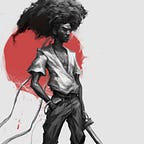Movie Review: Nairobi Half Life
A portrayal of the gritty Nairobi, city of hustlers
Nairobi Half Life is probably the most famous Kenyan-made movie - or the most popular. I had never watched it until now. I have just finished the one hour forty minutes movie and I am writing my thoughts write now while they are fresh.
The movie is about Nairobi and appropriately, it’s about hustling. Because Nairobi is a city of hustlers. It begins with Mwas trying to sell a movie CD to some men, smooth types who look down on him because he doesn’t make much money in his trade, not like them in their line of work (robbery, I believe). Then he is conned by a guy who lies to him that to become an actor he needs an agent and that will cost him a thousand (of course the guy claims he is himself an agent!)
Predictably, Mwas is robbed immediately after stepping foot in Nairobi. As if the crooks of the city can smell the village naivety on him. Then he gets arrested and gets thrown in a cell where he links up with Oti, who links him up with the life of crime. It kind of reminds me of Meja Mwangi’s Kill Me Quick, a novel which has a similar storyline: naive boys from the village come to Nairobi, suffer, and resort to a life of crime.
Mwas wants to be an actor. He wants to be in the movies. The movie starts with a Kill Bill reference. That was awesome. Mwas narrating how the Bride killed the eponymous Bill in that Tarantino classice. Mwas’s dramatic flair comes in handy at unexpected times - like when he was pulling stolen car parts covered with sack on a mkokoteni and then pretended to be a happy go lucky mkokoteni pusher when cops drive over in their car and stop him to interrogate him; or when he used his actorly gift of gab to negotiate an extra two thousand shillings from the guy the gang is selling the stolen car parts to.
Mwas dreams of being an actor, and he finds his way to Phoenix where he auditions for a part in a play. Then we actually get to see some scenes of the play during rehearsals and when the play is finally presented before an audience. The movie actually ends with the play. I loved this play within a play stylistic device, because of the relationship between the plots and themes of the play vs the movie itself. The play clarifies what the filmmakers want to say. This becomes apparent in the final minutes of the movie when Mwas gives an impassioned speech while in character, acting in the play. In the play, Mwas is a criminal who doesn’t steal the rich’s property, but instead leaves them warnings, telling them that he was there and there time is up. He wants them to be aware that he exists. Because the rich can be oblivious of the existence of other realities apart from their own.
The movie is thrilling. The scenes get you worked up. But in the end, we have to wonder if crime is worth it. I love that the movie shows the consequences of crime. Stories should show consequences - to ensure the audience does not romaticize things that should not be romanticized
I loved the use of Sheng and Gikuyu in this movie. It adds to the authenticity. Watching this, I never got the impression that it was made for white people. No, this movie was made for us. It’s a Kenyan movie with a Kenyan vibe. It concerns the side of Nairobi that a lot of people may not know much about or even want to: the downtrodden side, where young guys turn to crime to survive and young girls turn to prostitution.
Is the Nairobi of this movie an accurate portrayal of the city?
